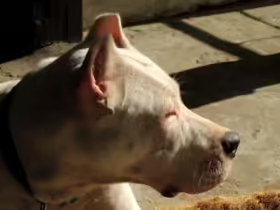Rottweilers are one of the most loyal and intelligent dog breeds, often known for their strong build and protective instincts. This breed is a dedicated companion and a highly effective guard dog, but Rottweilers also require consistent training, socialization, and care to bring out their best qualities.
This article explores the Rottweiler’s temperament, training needs, and essential care tips to ensure they grow up to be well-rounded, healthy pets.
Table of Contents
- Breed Overview
- Temperament and Personality
- Training Needs
- Exercise Requirements
- Nutrition
- Health Concerns
- Creating a Balanced Environment
- Final Thoughts
1. Breed Overview
- Breed Group: Working Group
- Height: 22 to 27 inches
- Weight: 80 to 135 pounds
- Lifespan: 8-10 years
- Coat Type: Short and dense, requiring moderate grooming
Rottweilers were originally bred in Germany as cattle herding and guard dogs. Known for their strong, muscular bodies and unwavering loyalty, they have a reputation as powerful yet devoted dogs. Rottweilers today often serve as family companions, therapy dogs, and working dogs in law enforcement.
2. Temperament and Personality
Rottweilers have a reputation for being formidable protectors, but their true personality reveals a deep loyalty and love for their families.
- Protective and Loyal: They are naturally protective, and this instinct can be an asset with proper training and socialization.
- Confident and Calm: Rottweilers are confident and composed, which makes them dependable companions when raised in a stable environment.
- Alert and Intelligent: Rottweilers are very observant and quick to learn new skills, making them excellent working dogs.
- Strong-Willed: This breed can be stubborn, especially if they sense inconsistency or uncertainty from their owner.
Tip: Due to their natural protectiveness, Rottweilers require a firm and confident owner who can establish leadership through positive reinforcement.
3. Training Needs
Training is essential for Rottweilers to channel their intelligence and ensure they interact well with family members, strangers, and other animals.
- Positive Reinforcement: Use rewards like treats, praise, and play to encourage good behavior.
- Early Socialization: Introduce your Rottweiler to various people, places, and other animals to reduce any overly protective instincts.
- Consistency and Patience: Rottweilers respond best to calm, consistent commands and guidance.
- Obedience Training: Commands such as sit, stay, come, and leave it are essential for this breed, as they help set boundaries and manage protectiveness.
Training Tips:
- Be Firm but Kind: Establish yourself as a confident leader without using harsh corrections.
- Engage Their Mind: Keep training sessions engaging and mentally stimulating to prevent boredom.
- Long-Term Training: Continue training throughout their life to reinforce good behavior and keep them mentally engaged.
4. Exercise Requirements
Rottweilers are a physically active breed, requiring regular exercise to stay healthy and prevent behavioral issues.
- Physical Exercise: Aim for 60 to 90 minutes of exercise daily, including brisk walks, jogging, and playtime in a fenced yard.
- Mental Exercise: Engage them with puzzle toys, agility exercises, or scent work to stimulate their mind.
- Structured Play: Rottweilers benefit from structured play, which reinforces obedience and provides an outlet for their energy.
Regular physical and mental exercise not only supports their health but also reduces boredom and destructive behaviors.
5. Nutrition
A balanced diet is essential for maintaining the health and well-being of a Rottweiler.
- High-Quality Protein: Rottweilers require a protein-rich diet to support their muscle mass and energy levels.
- Joint Support: Given their large build, consider foods with joint supplements like glucosamine or chondroitin, especially as they age.
- Portion Control: Rottweilers have a tendency to gain weight if overfed, so monitor portion sizes and avoid excessive treats.
- Hydration: Always provide fresh water, especially during warmer weather or after physical activity.
Feeding Tip: Divide their daily food intake into two meals to help manage weight and reduce the risk of bloat, a condition that can affect larger breeds.
6. Health Concerns
While generally robust, Rottweilers are prone to certain health conditions due to their genetic background and physical structure.
- Hip and Elbow Dysplasia: A common condition in large breeds, this can lead to arthritis and mobility issues.
- Heart Disease: Rottweilers are prone to a condition called subaortic stenosis, which affects the heart’s ability to pump blood.
- Cancer: Bone cancer (osteosarcoma) is seen in some Rottweilers, particularly as they age.
- Bloat: Like many large breeds, Rottweilers are at risk of bloat (gastric dilatation-volvulus), a serious condition requiring immediate medical attention.
Preventative Care: Regular vet visits, a balanced diet, and joint support supplements can help manage these risks. Additionally, maintaining a consistent exercise routine supports joint health and overall fitness.
7. Creating a Balanced Environment
Rottweilers are happiest in a structured, balanced environment that provides them with clear boundaries and ample mental and physical stimulation.
- Set Boundaries Early: Rottweilers respond well to clear rules, so establish boundaries from an early age.
- Socialization Matters: Regular socialization with other animals and people helps them feel at ease in different situations.
- Safe Space: Provide a comfortable resting area, such as a crate or bed, where they can retreat if they need some alone time.
- Responsible Ownership: Due to their protective nature, it’s essential to supervise interactions with other animals and be mindful of any territorial tendencies.
Tip: Avoid any games that may encourage rough or aggressive play, as this can increase possessiveness or assertiveness.
8. Final Thoughts
The Rottweiler is a powerful, loyal, and intelligent breed with a natural instinct to protect. While they may seem intimidating to some, with proper training, socialization, and care, they can be incredibly gentle and loving family members.
If you’re considering a Rottweiler, be prepared for a commitment to consistent training, socialization, and exercise. This investment will be rewarded with a faithful, protective, and devoted friend who brings strength, loyalty, and joy to your life.











Leave a Reply